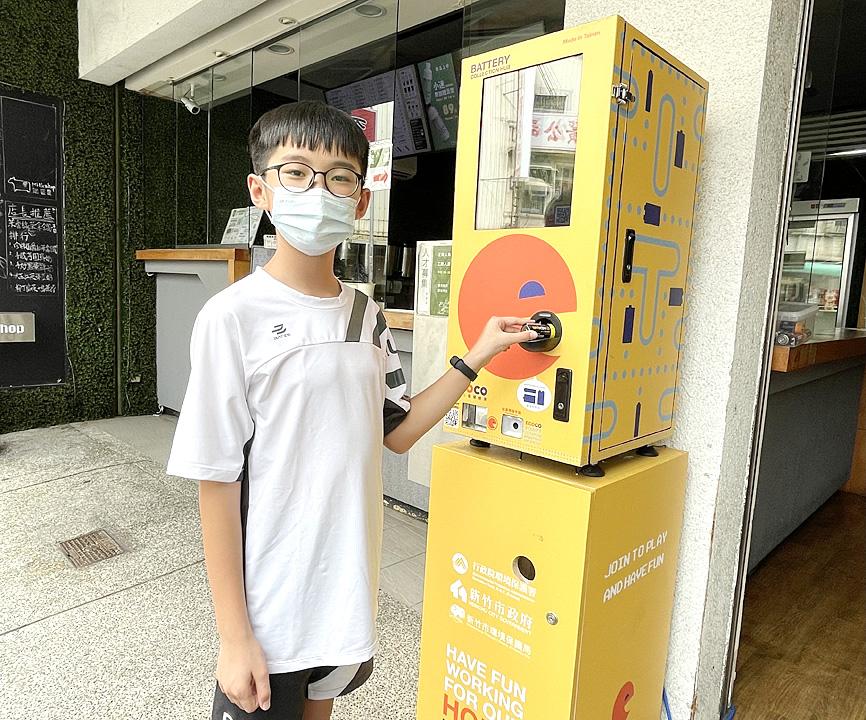Three 24-hour “smart” battery recycling stations recently set up around Hsinchu are capable of accepting seven sizes of dry-cell batteries in exchange for points that can be used for discounts throughout the city.
Aiming to encourage recycling while also reducing contact during the COVID-19 outbreak, the city collaborated with recycling start-up Ecoco to create the “battery hubs,” Hsinchu Mayor Lin Chih-chien (林智堅) said on Monday.
Taiwanese use 11,000 tonnes of dry-cell batteries every year, but only about 4,000 tonnes are recycled, the Hsinchu Environmental Protection Bureau said, citing Environmental Protection Administration data.

Photo: Hung Mei-hsiu, Taipei Times
To ensure that more of these batteries are recycled, the city collaborated with Ecoco to offer a solution that is flexible and attractive to consumers, it said.
The smart battery hubs can accept as few as one battery in exchange for Ecoco and Green Points, which can be spent on discounts or offers from participating businesses, the city said.
The machines are located at two MilkShop stores on Minzu Road and Beimen Street, and at the Showba general goods store on Dazhuang Road, the firm’s Web site shows.
They accept D, C, AA, AAA and AAAA batteries, as well as 9-volt batteries, but not the coin-type batteries, it said.
To collect points, users must first download the Ecoco Circular Economy (Ecoco循環經濟) and Green Point (環保集點) apps, the city government said.
Users can earn 250 Green Points for each battery, as well as 10 Ecoco points for type D and C batteries, and five points for other sizes, it said, adding that the stations are to be set up until Dec. 31.
On the Green Point app, 100 points are equivalent to NT$1 and can be used on public transportation, as well as at most major convenience stores and other participating businesses, it said.
Ecoco points can be exchanged for discounts or offers from nearly 100 businesses, including Showba, MilkShop, Foodpanda and Taiwan Taxi Co, the firm’s Web site shows.

The first global hotel Keys Selection by the Michelin Guide includes four hotels in Taiwan, Michelin announced yesterday. All four received the “Michelin One Key,” indicating guests are to experience a “very special stay” at any of the locations as the establishments are “a true gem with personality. Service always goes the extra mile, and the hotel provides much more than others in its price range.” Of the four hotels, three are located in Taipei and one in Taichung. In Taipei, the One Key accolades were awarded to the Capella Taipei, Kimpton Da An Taipei and Mandarin Oriental Taipei. Capella Taipei was described by

The Taichung District Court yesterday confirmed its final ruling that the marriage between teenage heir Lai (賴) and a man surnamed Hsia (夏) was legally invalid, preventing Hsia from inheriting Lai’s NT$500 million (US$16.37 million) estate. The court confirmed that Hsia chose not to appeal the civil judgement after the court handed down its ruling in June, making the decision final. In the June ruling, the court said that Lai, 18, and Hsia, 26, showed “no mutual admiration before the marriage” and that their interactions were “distant and unfamiliar.” The judge concluded that the couple lacked the “true intention of

EVA Airways today confirmed the death of a flight attendant on Saturday upon their return to Taiwan and said an internal investigation has been launched, as criticism mounted over a social media post accusing the airline of failing to offer sufficient employee protections. According to the post, the flight attendant complained of feeling sick on board a flight, but was unable to take sick leave or access medical care. The crew member allegedly did not receive assistance from the chief purser, who failed to heed their requests for medical attention or call an ambulance once the flight landed, the post said. As sick

INDUSTRY: Beijing’s latest export measures go beyond targeting the US and would likely affect any country that uses Chinese rare earths or related tech, an academic said Taiwanese industries could face significant disruption from China’s newly tightened export controls on rare earth elements, as much of Taiwan’s supply indirectly depends on Chinese materials processed in Japan, a local expert said yesterday. Kristy Hsu (徐遵慈), director of the Taiwan ASEAN Studies Center at the Chung-Hua Institution for Economic Research, said that China’s latest export measures go far beyond targeting the US and would likely affect any country that uses Chinese rare earths or related technologies. With Japan and Southeast Asian countries among those expected to be hit, Taiwan could feel the impact through its reliance on Japanese-made semi-finished products and